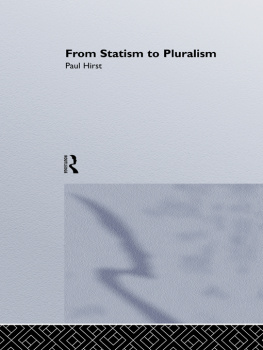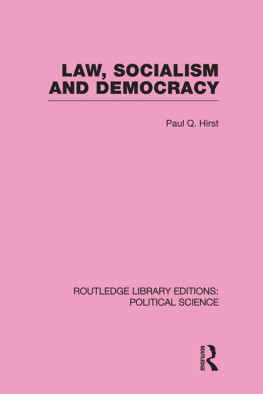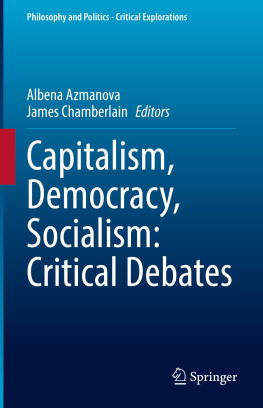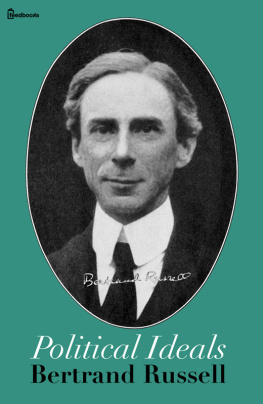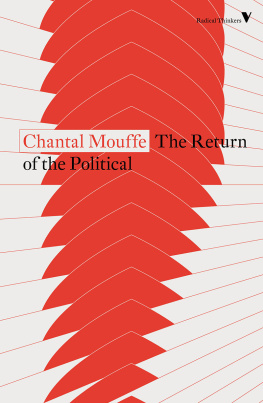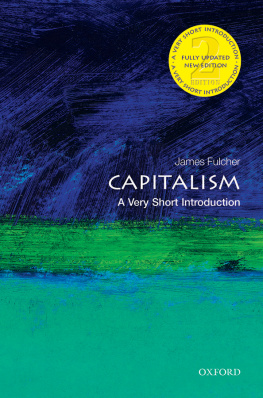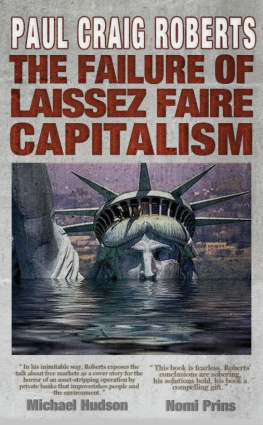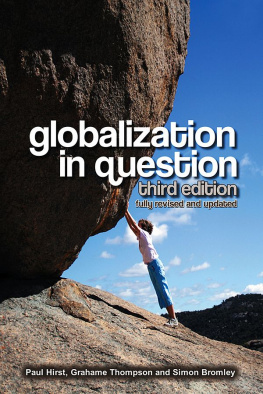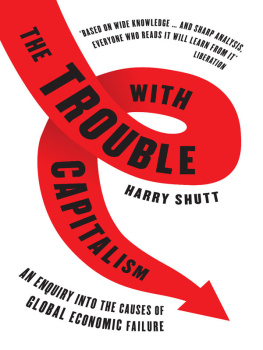From statism to pluralism
Modern societies currently lack positive alternative visions of the future. Many commentators have claimed that the only option is a return to free-market capitalism, in which success and survival depend on being as competitive as possible whether as a nation, firm or individual. Yet nations such as Germany and Japan, that might have provided a model of how to do this, are now seen to be failing, and the future for firms seems to be one of ceaseless adaptation to rapid change.
Paul Hirst argues that there are viable alternative futures. In From statism to pluralism he advances a model associative democracy that, he suggests, addresses the major obstacles to democracy today. Associative democracy is a way of revitalizing democratic accountability and economic governance, through devolving social affairs to voluntary self-governing associations. In a post-liberal society dominated by large, hierarchically-controlled organizations in both the private and public sectors, associative democracy provides a means to re-establish democratic ideals and liberal values.
These provocative and compelling essays from one of todays most lively and inventive thinkers, represent an attempt to re-state a practical third way between the discredited ideals of state socialism and laissez-faire capitalism. From statism to pluralism will be essential reading for all those interested in the ideological renewal of the left.
Paul Hirst is Professor of Social Theory, at Birkbeck College, University of London. He is the author of fourteen books including Pre-capitalist modes of production (1975, with Barry Hin dess), Marxism and historical uniting (1985), After Thatcherf (1989), Associative democracy (1993), and Globalization in question (1996, with Grahame Thompson). His work has been translated into German, Japanese, Portuguese and Spanish.
From statism to pluralism
Democracy, civil society and global politics
Paul Hirst
Birkbeck College, London
Paul Hirst 1997
This book is copyright under the Berne Convention.
No reproduction without permission.
All rights reserved.
First published in 1997 by UCL Press
Routledge
2 Park Square, Milton Park, Abingdon, Oxfordshire 0X14 4RN
711 Third Avenue-, New York, NY 10017
Routledge is an imprint of the
Taylor & Francis Group
First issued in paperback 2011
British Library Cataloguing in Publication Data
A catalogue record for this book is available from the British Library.
Library of Congress Cataloguing in Publication Data are available.
ISBN13: 978-1-857-28750-9 (hbk)
ISBN13: 978-0-415-51613-6 (pbk)
Contents
| 1. |
| 2. |
| 3. |
| 4. |
| 5. |
| 6. |
| 7. |
| 8. |
| 9. |
| 10. |
| 11. |
| 12. |
| 13. |
| 14. |
| 15. |
Acknowledgements
I am specially grateful to Lars Bo Kaspersen and Jonathan Zeitlin for help and advice in preparing this collection, and to Caroline Wintersgill of UCL Press for her help and patience in the process of deciding what should be included. I owe a great debt to Jane Tinkler for preparing the manuscript.
The original places of publication of the following chapters were:
Chapter 2 in Dissent (New York) Spring 1994
Chapter 3 in David Held (ed.) Prospects for Democracy , Cambridge: Polity Press, 1993.
Chapter 4 in B. Pimlott, A. Wright and T. Flower (eds) The Alternative, London: W.H. Allen, 1990.
Chapter 5 in B. Hindess (ed.) Reactions to the Right , London: Routledge, 1990.
Chapter 6 in Parliamentary Affairs 48(2) , 1995.
Chapter 7 in P. Hirst and S. Khilnani (eds) Reinventing Democracy Oxford: The Political Quarterly/Basil Blackwell, 1996.
Chapter 8 in Renewal 4(2) , 1994.
Chapter 9 in Australian Left Review (Sydney) September 1992.
Chapter 10 in Economy and Society 20(2), 1991.
Chapter 11 in L. Freedman (ed.) Military Intervention in European Politics, The Political Quarterly/Basil Blackwell, 1994.
Chapter 12 in London Review of Books, 11(22) 1989.
Chapter 13 in Prospect February 1996.
Chapter 14 in K. Dean (ed.) Politics and the Ends of Identity , Andover: Avebury, 1997.
Chapter 15 in Renewal 4(4) , 1994.
1
Introduction
Modern societies appear to be trapped: between the increasingly oppressive actuality of a capitalist system drifting toward a restoration of laissez faire, and the absence of any viable alternative to it. Socialism in the sense of a comprehensive alternative to the market system is dead. The brutalities of actually existing socialism have fatally crippled the power of socialist ideas of any kind to motivate and inspire. Social democracy too seems muted and ineffective. The collapse of revolutionary socialism and the decline of wars between the major industrial states have removed the major justifications of social democracy for established elites that it could prevent the worse evil of communism and that it could harness organized labour in the national war effort. Those elites have not merely turned against social democracy, but they also seem to have convinced significant sections of the population that a regulated economy and comprehensive social welfare are either unattainable or undesirable.
Modern politicians in the advanced states operate within a narrow political spectrum in which they all claim to be democrats and they all embrace the market system as the only possible form of economic organization. Yet the democracy they espouse is of a narrowly plebiscitarian variety, in which the people periodically choose who are to be their elected masters. The economic policies they advocate are those of the financial and business elites sound money and the pursuit of microeconomic efficiency. In these circumstances the electorate have a choice between variants of the same, and increasingly they are indifferent to the political process and cynical about what it can accomplish.
In these circumstances the people have been robbed of any kind of political hope, of an imagined collective future that would be attainable and better than the present. Given this then there is little that is worth striving for in the company of others. Hope is reduced to individual success in the competitive race and aspirations reduced to a desire for material things to a second car or a swimming pool. This political climate has also robbed social theory of much of its purpose. It now has little to say about the general character and evolution of modern societies. The result is, on the one hand, an ironic postmodernism that denies the possibility of imagined futures founded upon a rigorous analysis of the present, and, on the other hand, a reduction of social action to economics, to the calculation of the rational self-interested agent. The critical forms of social theorizing retreat from social generality into a concern with specific issues, chiefly into an obsession with personal and group identities and with the particular discontents that arise from them.
The essays collected here are an attempt to respond to this situation: on the one hand, to argue that there are alternative imagined futures that can be defended and that are capable of motivating large numbers of citizens; and on the other hand, to claim that modern societies are not condemned to evolve into variants of a brutalized consumer capitalism that excludes increasing numbers of people from full social and economic citizenship. The approach to contemporary problems offered here is distinctive in two senses. First, in terms of political theory: the approach is to reason from existing political institutions and contemporary political problems toward possible alternatives. This is in contrast to the retreat of most of modern political theory from institutions and problems of governance, either into the elaboration of abstract normative concepts divorced from political actualities and possibilities, or, into the elaboration of methodological tools for an objective political science. Secondly, these essays expound a definite political doctrine associative democracy that is, a practical third way between collectivist state socialism and laissez-faire capitalism. It is a restatement and renewal of ideas that have resurfaced after many decades of neglect. In a changed conjuncture these ideas are attracting increasing support as people from diverse political positions recognize the need for and the possibility of a reform and reshaping of existing institutions that goes beyond the decayed orthodoxies of the left and the right. The objective of such reform is to deepen and to extend democratic control, thus enabling more informed decisions and thereby more effective economic and social governance. The public mood is changing toward greater dissatisfaction and a willingness to contemplate change.

